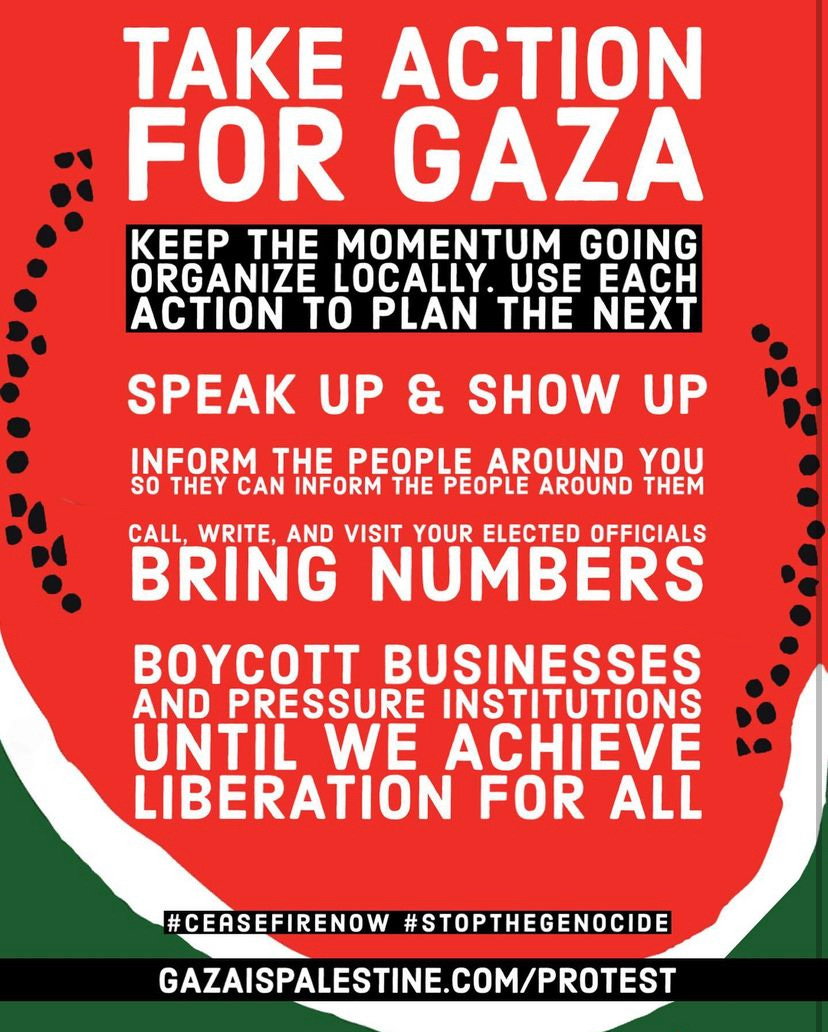
I was born a Black woman and now I am become a Palestinian against the relentless laughter of evil there is less and less living room and where are my loved ones? It is time to make our way home.
— June Jordan, Moving Towards Home
Being apolitical is political, beloved. And anyone who has ever asked you to politely “leave politics out of it” most likely didn’t deeply care whether you lived or died or didn’t fully understand what’s at stake. I wish I was exaggerating.
My teaching practice was launched five years ago in Brooklyn, NY where I found myself teaching cohorts of black and brown students how to build software using languages and libraries like Ruby, Ruby on Rails, JavaScript, React, etc. Languages and libraries that are terraforming how we relate to each other online and off. Almost everyday we would have side conversations outside the classroom about gender, class, race and labor. I began to wonder, instead of these being side conversations, is it possible to write conversations on intersectional oppression INTO a coding curriculum? I began to realize solely teaching coding using the school’s curriculum citing Pokemon, Harry Potter and Lord of the Rings as references is just as political as teaching coding using Audre Lorde, Octavia Butler, Fannie Lou Hamer and abolitionist references. From 2018 to 2020 I looked for a coding curriculum rooted in a politic of black feminism and that journey of inquiry materialized into Seeda School.
In last night’s Black Women Radicals, Black Feminist Writers and Palestine webinar Angela Davis quoted Wahneema Lubiano who said, “The more normal something appears to be, the more ideological it is”. I want to call in all teachers, writers, artists and business owners to take a close look at what we’re “normalizing” in our practices. What cultural examples are we using to teach that feel apolitical? What references are we pointing to in our art that feel “neutral”? What narratives are we normalizing in our writing? What topics are we avoiding on our business accounts on social media? What are the employers, organizations and institutions we’re connected to authorizing as the “professional stance”? What ideologies are we upholding in an attempt to be apolitical? Whose politics are we re-inscribing when we “leave politics out of it”? I am writing this to remind us that being apolitical is an impossible and violent pursuit.
Being apolitical is a threat to collective discourse and silence1 is a cost way too high for folks white supremacy, zionism and colonization normalizes killing. Audre Lorde reminds us, the machine will try to grind us into dust, whether or not we speak. And when our bodies are returned to the forest, my wildest dream is that the forest feels our fire as our flesh decomposes into mycelium memory. When our ashes are returned to the river may our dust echo across space and time! May the river remember, may generations forward and backward remember, we chose liberation over peace, again and again and again.
As a black feminist artist, writer, teacher and business owner witnessing the decades old active and on-going genocide of the Palestinian people I feel called to deepen and expand my black feminist politic beyond the context of the United States. As someone with enslaved ancestors on both sides of my family I have always rooted my political education in black, U.S., abolitionist and liberation movements which traces oppression back to colonization and the Trans-Atlantic Slave Trade. I had always had an international awareness of how oppression interlocks across borders, but that awareness rarely extended beyond engaging with the latest geopolitical headline. I am looking at my library of hundreds of books and seeing mainly Black-American writers. I am thinking about my favorite films and how they’re all in English. I am thinking about all my favorite scholars and noticing how Western focused their scholarship can be. I am reminded that this is not sufficient. I am reminded that this, too, is part of the problem. Inside Ijeruka’s Digital Kinship Course Dimah Mahmoud reminded us our black feminist politic must extend beyond the U.S. and this reminder was echoed again during last night’s Black Feminist Writers and Palestine panel. We can’t talk about liberation in the United States without talking about Sudan, without talking about Haiti, without talking about Palestine. How might we weave these inter-connected political struggles into our curriculum, poems, paintings and mission statements?
Actions Toward An International Black Feminist Politic
Here is how I’m currently weaving a more international perspectives into my black feminist politic, writing, teaching and art making — I am sharing because I want to invite you to do the same…
I want to invite us to read as much as we can get our hands on. There are a lot of reading lists going around like this one compiled by Hanna Phifer. I'm starting there and with the Solidarity with Palestine - A Radical Black Feminist Mandate reading list.
Following Audre Lorde I want us to transform our silence into language and action, and I am a firm believer that sometimes the reflections and language need to marinate in our journals before spilling out on social media. Sometimes our gut reaction/response is dripping with misinformation, unaddressed trauma or ideology inherited from family or institutions. There are times when reflective silence can be an act of solidarity, as we draw more informed conclusions — as long as we don’t stay there forever. During these moments of deep listening and spongy expansion, bathing in poetry and signing up for reflective writing workshops like Black Feminist Becoming: Sand, Solidarity and Practice organized by Alexis Pauline Gumbs helps with moving through collective grief.
In the spirit of deep listening, I also like to tune into conversations like Black Feminist Writers and Palestine. Attending public discussions, panels and witnessing folks in dialogue allows me to experience ideas form, fall apart and come together again in real time. There is change, emergence, generative conflict, doing and undoing that tends to only happen in real time conversations. Conversation produces an intellectual unfolding which is harder to replicate in books, monologues and solo presentations. Folks get critiqued, panelists change their mind and sometimes we all leave the conversation in completely different places than when we started. Witnessing silence transform into language and action in these moments are often most instructive for me. It’s the reason I fell in love with the classroom and collective study. Participating in these spaces reminds us our ideas are never fixed and releases the fear or ego that might stop us from speaking against tyranny in the first place.
In last night’s panel there was also an invitation to root inside of community during this time — a mandate to find a political home. The more outspoken we become in our calls and struggles toward liberation, the more our safety will be compromised, but the promise of community is shelter. In a neoliberalist society where there is no social safety net, we become each other's web2 of safety. As someone who recently moved from Richmond, VA back to DC, I’m looking forward to reconnecting with my creative and political community here. If you’re a black feminist in the area, please get in touch!
The Audre Lorde Questionnaire to Oneself3
What are the words you do not have yet? [Or, “for what do you not have words, yet?”]
What do you need to say? [List as many things as necessary]
“What are the tyrannies you swallow day by day and attempt to make your own, until you will sicken and die of them, still in silence?” [List as many as necessary today. Then write a new list tomorrow. And the day after.]
If we have been “socialized to respect fear more than our own needs for language and definition”, ask yourself: “What’s the worst that could happen to me if I tell this truth?”* [So, answer this today. And every day.]
The Audre Lorde Questionnaire to Oneself is the centerpiece of the Module 1 Project in the Seeda School Software Engineering Program and the seed of the Seeda Syllabus. I want to invite us to answer it again, then speak. Refuse the normalization of silence. Speak up at the dinner table, speak up inside the classroom, speak up at work and resist the silently, loud ideology of colonization coating all conversations, rooms and occupied land that asks us to “keep politics out of it”. We will speak, then get it wrong, then try again, remembering witnessing our transformation of silence into language and action will be instructive for someone else, somewhere else. Today and forever we remember fearful silence serves no one but our oppressors. Today and forever we remember the song of liberation is already present on our tongue and in our imaginations. Today and forever we sing, Free Palestine.
In solidarity,
Ayana
Read
Moving Towards Home by June Jordan
The Transformation of Silence Into Language and Action by Audre Lorde
Solidarity with Palestine - A Radical Black Feminist Mandate: A Reading List
Reflective Essays on Palestine From Other Substack Writers I Follow
sunday energy #39 published on Carefree Black Girl by Zeba Blay
My heart, oh, Palestine published on How to Cure A Ghost by Fariha Róisín
Watch
Black Feminist Writers and Palestine organized by Black Woman Radicals and featuring remarks from: Clarissa Brooks, Angela Y. Davis, Breya Johnson, Briona Simone Jones, Jaimee A. Swift and Beverly Guy-Sheftall
June Jordan reading “Moving Towards Home” (25:25) at The Poetry Center at San Francisco State University on August 20, 1998.
Do
Take Action for Gaza: Demands from the gazaispalestine and adalahjusticeproject
Engage with the Palestinian Youth Movement’s linktree
March on Washington, Saturday November 4th at 2PM at Freedom Plaza
I also welcome you to expand your black feminist politic to the scale of inter-connected, international, intersectional oppression using the invitations outlined in this newsletter
And it is never without fear of visibility, of the harsh light of scrutiny and perhaps judgment, of pain, of death. But we have lived through all of those already, in silence, except death. And I remind myself all the time now that if I were to have been born mute, or had maintained an oath of silence my whole life long for safety, I would still have suffered, and I would still die. — Audre Lorde, The Transformation of Silence Into Language and Action (1977)
Lukaza Branfman-Verissimo, we web keepers (2022), published by Printed Matter. Print their posters in solidarity with Palestine here.
The Audre Lorde Questionnaire to Oneself was adapted from “The Transformation of Silence into Language and Action,” collected in The Cancer Journals. This resource was created by Divya Victor for students of her Creative Writing courses at Nanyang Technological University in January 2016.








✊🏽
Thank you for your voice, your courage, and your action, Ayana.